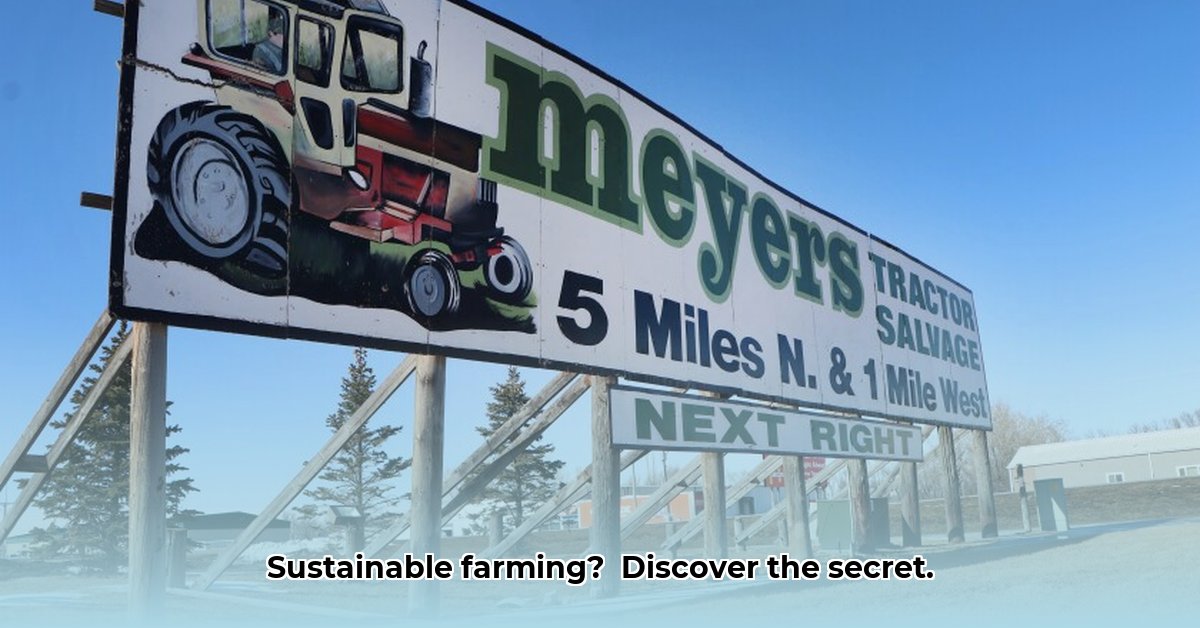
A Case Study in Sustainable Agriculture and Salvage Operations
Meyers Tractor Salvage (MTS) in Aberdeen presents a compelling case study in sustainable agriculture. By offering salvaged tractor parts, MTS aims to reduce the environmental impact and financial burden associated with new equipment purchases. However, a balanced assessment reveals both significant potential and considerable challenges in realizing this vision. This article analyzes MTS’s role in sustainable farming, considering both its successes and shortcomings. Does it truly deliver on its promise of cost savings and environmental responsibility? The answers are multifaceted. For information on new tractors, check out this resource.
Sustainable Practices Assessment: Recycling and Resource Efficiency
MTS directly addresses a major environmental concern in modern agriculture: the resource intensity of new machinery production. Using salvaged parts significantly reduces the demand for new manufacturing, leading to lower energy consumption and reduced material extraction. This aligns with the core principles of sustainable agriculture, minimizing the industry's carbon footprint. The salvage and reuse of metal parts also represents a significant contribution to the circular economy, diverting waste from landfills and promoting resource recycling. This aspect alone positions MTS as a valuable player in the broader effort to create more environmentally responsible farming practices. But the financial benefits are equally compelling.
Cost Savings and Economic Viability for Farmers
The economic advantages of using salvaged parts are readily apparent. Reconditioned or salvaged parts are typically far cheaper than their new counterparts, offering substantial cost savings for farmers, particularly in challenging economic climates. This cost advantage can be substantial, potentially freeing up capital for other essential farming investments or contributing to improved profitability. However, farmers must weigh these savings against potential risks associated with parts reliability, a point we will examine next. Do these cost savings outweigh the potential drawbacks?
Challenges and Criticisms: Addressing Customer Concerns and Operational Shortcomings
While the environmental and economic benefits are enticing, significant challenges exist. Customer reviews reveal inconsistencies in part quality, service responsiveness, and order fulfillment. Some farmers report difficulties in finding specific parts and receiving timely responses to inquiries. The MTS website itself contributes to this issue; its lack of detailed inventory information and user-friendly navigation severely hinders the customer experience, making it difficult for farmers to find the parts they need. These operational deficiencies, along with inconsistent feedback, raise concerns about the reliability and overall usability of MTS for many farmers.
Analysis and Recommendations: Building a Stronger Sustainable Business Model
MTS has the potential to play a significant role in sustainable agriculture. However, addressing existing shortcomings is crucial for maximizing its impact. Key recommendations for improvement include:
Enhance Online Accessibility: Develop a user-friendly website with detailed inventory listings, high-quality images, clear pricing information, and comprehensive descriptions of parts. This would improve transparency and ease of use for potential customers, vastly improving the overall customer experience.
Improve Customer Service and Communication: Implement a robust customer relationship management (CRM) system and actively address customer concerns through prompt and professional communication. This will improve trust and encourage repeat business.
Establish Clear Shipping Policies: Clearly outline shipping costs, timelines, and insurance options to manage customer expectations and avoid misunderstandings.
Increase Transparency of Environmental Practices: Publicly share environmental impact data and consider obtaining relevant certifications to enhance credibility and attract more environmentally conscious customers.
These improvements are not merely cosmetic; they are crucial for establishing trust and building a sustainable and prosperous business model.
Conclusion: The Path to Sustainable Farm Equipment Sourcing
Meyers Tractor Salvage offers a viable pathway towards more sustainable farming practices. The potential for cost savings and environmental benefits is undeniable, but the challenges related to customer service, website usability, and transparency must be addressed. By implementing the recommended improvements, MTS can enhance its position as a valuable resource for environmentally conscious farmers and strengthen its contribution to a more sustainable agricultural future. The success of MTS will serve as a practical model for other salvage operations seeking to integrate sustainability into the farming sector.